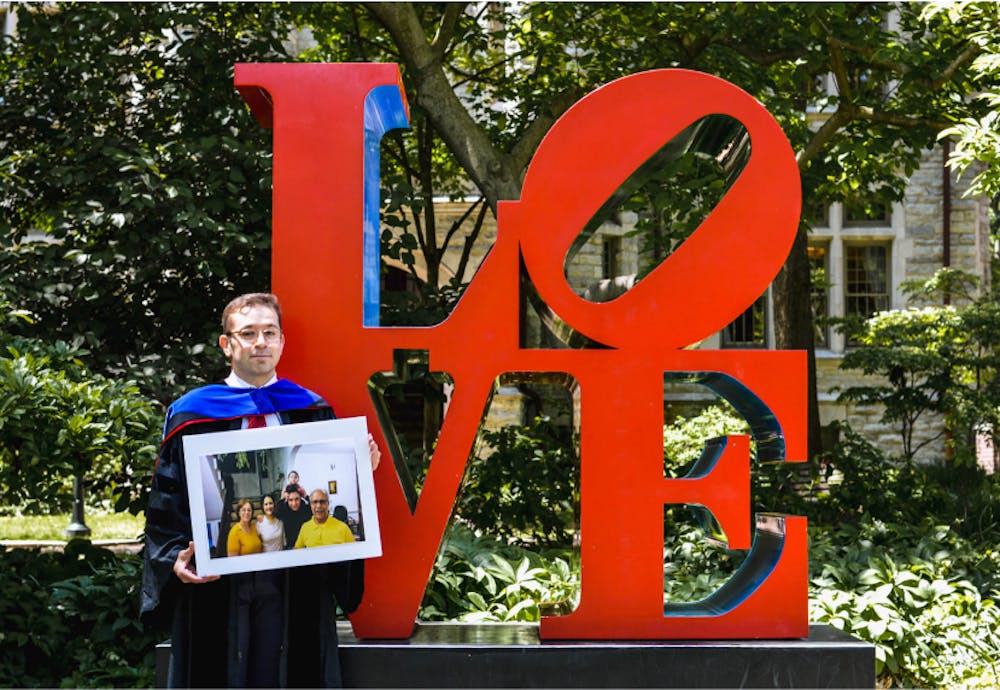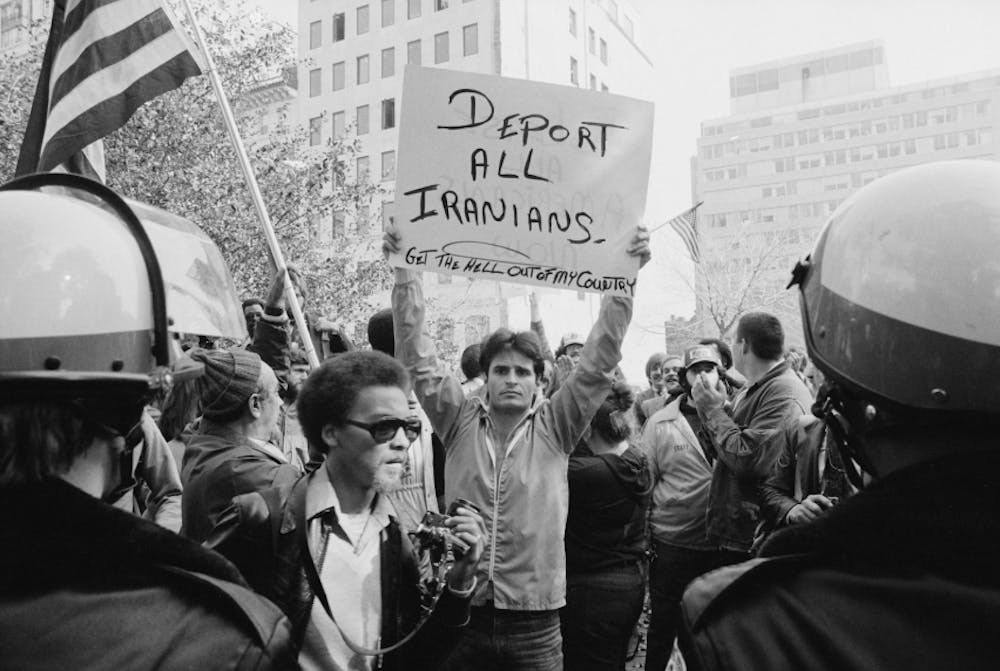
Daniel holding a printed photo of his family at his graduation.
Credit: Wenting SunOnce the biggest international student body in the United States, a myriad of political events has transformed every single angle of the Iranian immigrant experience. With the turmoil of Iranian revolution, followed by war and oppression in the Middle East, different waves of Iranian immigrants have come here to find a safe haven in the United States. They are right here at Penn — possibly your neighbor, friend, or teacher — and have been contributing as historians, doctors, architects, chemists, and engineers. However, like any other immigrant experience, it is paved with different forms of xenophobia, racism, and religious hatred. In order to understand how and why we got here, one has to put the historical context of the past few decades into perspective, and use this understanding in order to shape a better future.
The Iranian experience is particularly smeared with political tensions and their social reactionary behaviors. A socio-political atmosphere charged with tensions could easily result in microaggressions, and over time turn into policies that legitimize hatred and discrimination. Unfortunately, the Iranian immigration experience follows a similar pattern. During the hostage crisis in the 80s, our community faced many hostile experiences here at our very own campus. More recently, with the ongoing political tensions, there are new forms of prejudice on the rise. Unfortunately, international students are at the forefront of experiencing such acts: from everyday microaggressions to violent hate crimes.
At the height of the hostage crisis in 1980, while the political tensions were rising, President Carter announced that he was severing diplomatic ties with Iran. While much is talked about regarding how this incident changed the Iran-America relationship, what is often ignored is how this transformed the ordinary lives of Iranians in the U.S who suddenly found themselves in a political turmoil. An estimated 150,000 Iranians held American visas at the time. With the anti-Iranian sentiment on display at demonstrations, many Iranian students had to hide their nationality in order to avoid being mistreated on campus. Hamid Dabashi — a Penn Ph.D. alumnus — remembers students marching on Locust walk chanting, “Nuke Iran, maim Iranians!”
A man holding a sign during Iranian hostage crisis protest, 1979. (Photo by Marion Trikosko)
The end of the hostage crisis was not the end of the psychic toll on U.S.-based Iranians. Over the next few decades, the continuation of the politically-charged environment, combined with heated media coverage, emboldened the hatred towards foreigners. The catastrophic terrorist attacks of Sept. 11 was another blow to immigrant communities, especially Iranians. Only in such a negative atmosphere could a newspaper portray Iranians as cockroaches, or a senator joke that having Iranian ancestry is a “terrible” circumstance.
With President Trump’s election, we see the same hateful dialogue played out at a higher volume. Early on in his presidency, Trump signed his infamous executive order banning citizens of seven countries — including Iran — from entering the U.S. This order tore many families apart and left many individuals vulnerable to newly-emboldened bigotry.
2015 Penn Alumna Fereshteh Abbasi was personally affected by the travel ban. She and her American husband moved to the Caribbean for a short-term academic visit in early 2017. A few weeks after Trump’s sudden announcement, the couple was stranded overseas. Even more than two years after Trump's order, the couple still remains unsure if they can get back to their normal life. The State Department has announced that there will be waivers, but the process lacks clarity, and therefore has not been working.
Sadaf Amin, a Penn postdoctoral researcher in molecular biology, has not been able to travel back to visit her family since 2011: “In the beginning, my mother would visit me every other year, but we have not been able to see each other after the Muslim Ban went into effect.” Even the moments that are traditionally meant to be happy are made impossible because she is not able to celebrate them with her family: “I got married, I walked for graduation — events that every mother dreams of seeing.”
In just a few days, the class of 2019 is going to graduate. Many have family coming to share these once-in-a-lifetime moments with each other, but for some, the story is not that happy. Many individuals, like me, will walk across the stage without any parents present at the ceremony, thanks to President Trump.
We are living in troubling times. Nationalism and xenophobia are on the rise, and the culture of tolerance and openness is under attack. The U.S., the country with the largest share of international students, is increasingly becoming unwelcoming. Beyond the immorality of this trend, this drives away the future professional workforces of the economy. Many talents, like Abbasi and Amin, are actively being forced to seek freedom elsewhere, and losing such individuals is, in effect, losing years of investment and training in a highly competitive educational system.
The Iranian experience is just one example of how international conflicts can spill over and result in discriminatory policies that touch the lives of ordinary citizens, possibly for decades. The only people who can help are you. Inform your friends and neighbors; ask your representatives to support bills against the travel ban; and ask your politicians to engage in dialogue and diplomacy, resist the temptations of gun lobbies rather than banging on the drumbeat of war, and condemn hate and discrimination. While the focus here was on the Iranian experience, this is not, by any means, just an Iranian issue: Asians, Sikhs, Jews, Arabs, and other immigrants have all been struggling with such vicious cycles, one way or another. If we don’t stand up for each other, no one will.
DANIEL KHASHABI is a recent Ph.D. graduate from the University of Pennsylvania, and an incoming researcher at the Allen Institute for Artificial Intelligence. His email address is danielkh@cis.upenn.edu.
The Daily Pennsylvanian is an independent, student-run newspaper. Please consider making a donation to support the coverage that shapes the University. Your generosity ensures a future of strong journalism at Penn.
Donate



